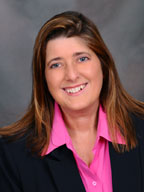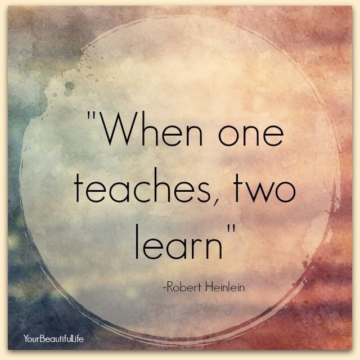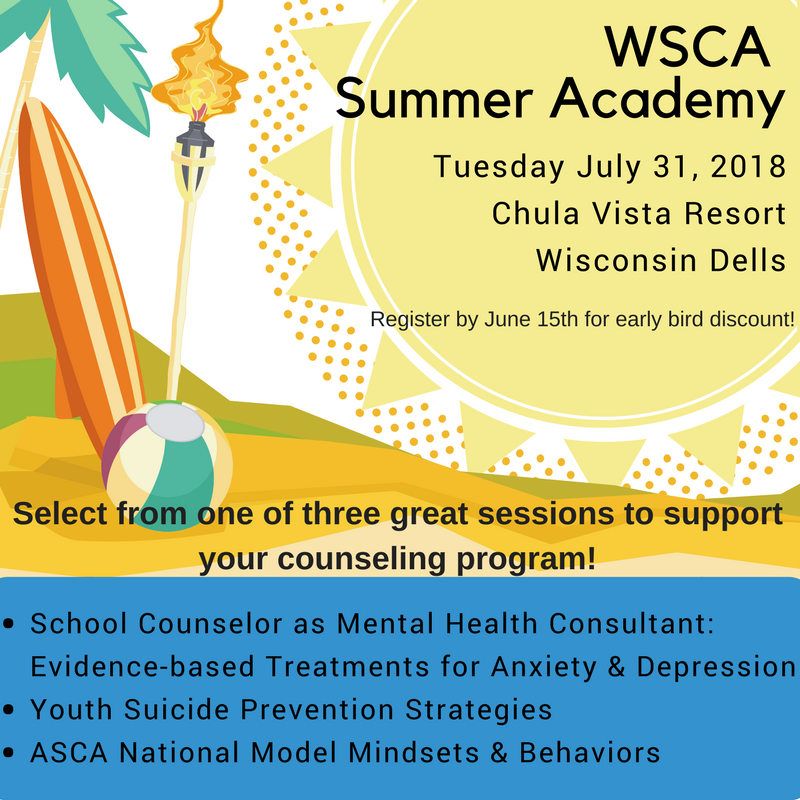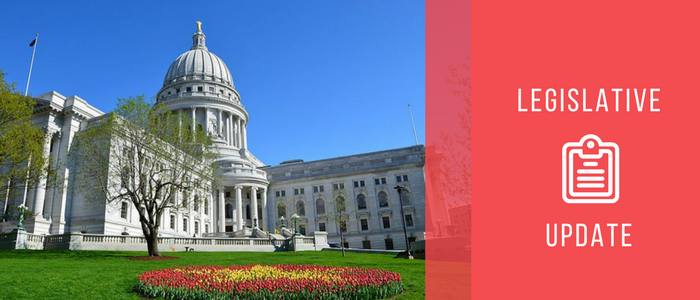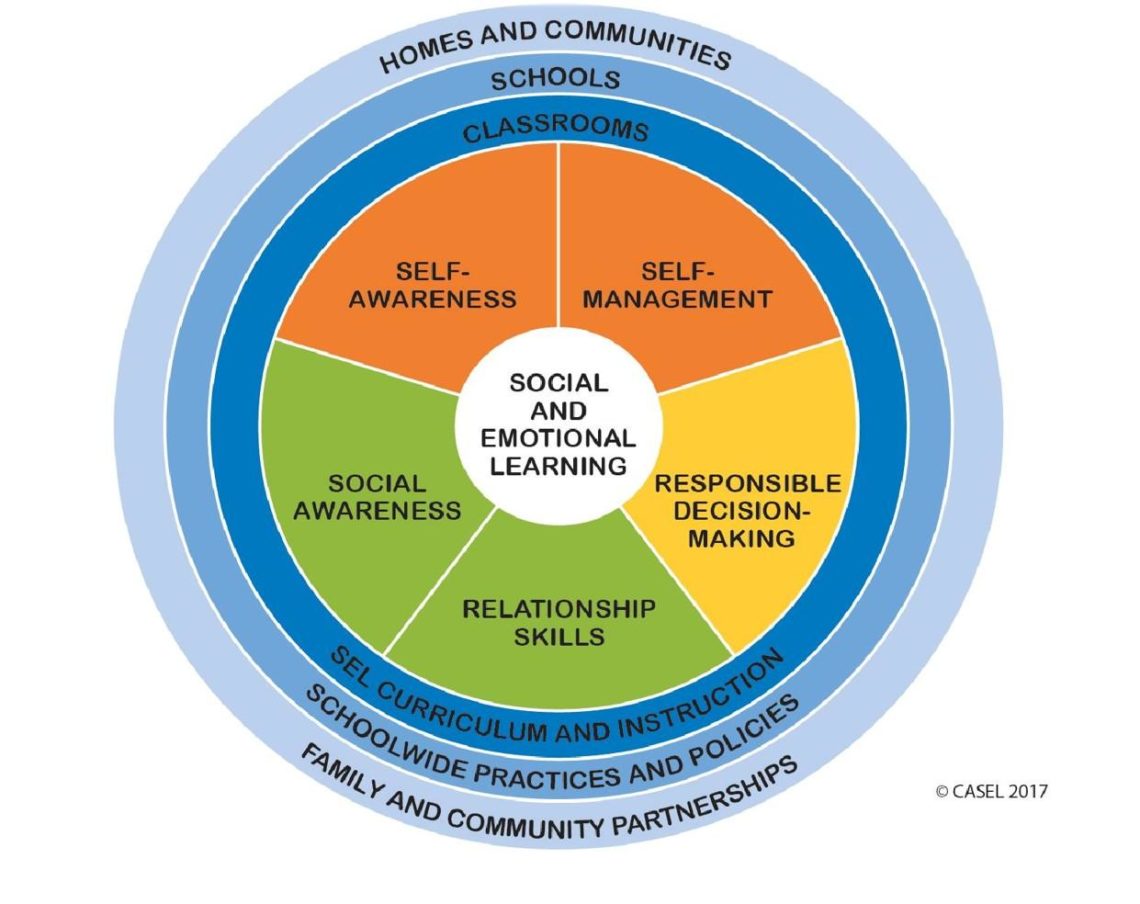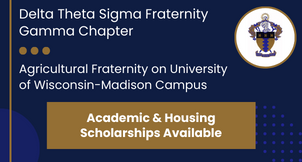July 2018

In This Issue:
A Message from Your Executive Director
Recharge Your Own Practice: Professional Development That Has Made All the Difference
Summer Academy
Legislative Update
Counselink
Social Emotional Learning Resources
Upcoming Events and Committee UpdatesA Message from
Your Executive Director
Summer Learning and Planning
It has already been a busy summer with many learning opportunities and WSCA planning. As always, it is humbling to be a part of such a great team of leaders that volunteer their time, energy, and lived experience to make WSCA meaningful for members.
An observation from the professional development and conferences I have attended since the beginning of summer is that words matter. There is a lot of talk about the “G” word in school counseling. At every single event, counselors were called “guidance counselors”, usually with a story about a long ago negative experience or inaccurate information someone has about school counselors. The reason we have been trying to change our title since the 1990’s is because our roles and responsibilities have changed significantly in the past 25 years.
WSCA needs school counselors across the state to advocate and educate our communities’ members about our role and counseling programs in schools. WSCA leaders will support you in this work by creating resources and materials for you to present and share at the local level. There are school counselors in 99% of the schools in Wisconsin, and there are over 2.000 of us in the state. Imagine the impact we can have if we come together to educate our stakeholders. Look for more information and resources on this project in September.
If you would like to discuss advocacy with the WSCA leadership team, please consider attending the WSCA Summer Academy on July 31st in Wisconsin Dells. All WSCA leaders participate in this event and welcome listening and learning from members.
In addition to all the planning and learning you are doing this summer, we hope you take time for rest and rejuvenation.Stacy
Recharge Your Own Practice: Professional Development That Has Made All the Difference
By Laura Multer, School Counselor
In the field of pedagogy, learning by teaching is a method in which students are made to learn material and prepare lessons to teach it to other students. Scientists now call the long-known fact, that the best way to understand a concept is to explain it to someone else, “the protégé effect.” The Roman philosopher Seneca said “While we teach, we learn.” As school counselors, we are in an ideal position to improve our practice while teaching others. We can truly be agents of change through our own professional development and by sharing what we have learned with other educators and stakeholders.I first read Carol Dweck’s book, Mindset: The New Psychology of Success a couple of years ago. While I enjoyed the book, I really started to embrace the concepts of the book when I took a virtual course that required me to reflect on the book and share my thoughts with fellow students. However, it was when I taught a growth mindset course to my colleagues, fellow educators in my school, that my learning (and the learning of others) resulted in changed educational practices and culture within our school. Teachers reported that learning about growth mindset changed their professional practice and positively impacted their personal lives as well. We integrated the ClassDojo Growth Mindset videos into our PBIS (positive behavioral interventions and support) program. Educators and students alike started referencing the “power of yet.” This was a true example of professional development not only recharging one school counselor’s professional practice, but changing the culture in an educational setting.Another example of professional development that recharged my own practice, and that of fellow educators, was the introduction of mindfulness practices. Knowing that our district staff would be embarking a year-long focus on mindfulness, I took a mindfulness course the semester prior to implementation. By doing so, I was able to use my prior knowledge to better support classroom teachers. I was able to share how I had used these practices with students and even demonstrated various techniques when I was delivering lessons in classrooms. When school counselors are “early” adopters/implementers of research-based educational and social-emotional practices, we can be true agents of change. As we are often one of only a few or perhaps the only one in our role in our buildings and have caseloads far beyond the recommended 250 to 1 ratio, we must find ways to engage our fellow educators in implementing our school counseling program and supporting the social-emotional learning of our students. By being leaders in or supporting the implementation of professional development, we can be far more efficient in meeting the academic, social-emotional, and career needs of our students.Lastly, learning in order to teach others results in a more comprehensive understanding of the material. Researchers have found that even learning with the intention of teaching others resulted in improved communication skills, increased confidence, and improved leadership ability (Fiorella, Mayer (2013). We can serve as leaders while also improving our own professional practice when we take advantage of opportunities to provide professional development to other educators and others who support children. Below are some possible opportunities to consider when looking to recharge your own practice via providing professional development for others:
- Share highlights of conferences or other professional development at staff meetings
- Present at building or district professional development days
- Lead or serve as an early adopter of new building or district initiatives
- Lead book discussions or teach a course to colleagues within your building or district
- Facilitate parent and/or community book reads or offer presentations for parents/guardians on educational and/or social/emotional topics
- Present at local area school counselor networking meetings or establish regular meetings if they don’t currently exist
- Present at Cooperative Educational Service Agencies’ (CESAs) professional development events
- Serve as adjunct faculty at local technical colleges or two and four year colleges and universities
- Submit an article for submission for the WSCAlink publication
- Present at the WSCA annual conference
- Serve on a WSCA committee or as a coordinator or board member
- Present at national conferences such as American School Counselor Association conference or other student services or mental health professional conferences.
Fiorella, Mayer (2013). The Relative Benefits of Learning by Teaching and Teaching Expectancy. Contemporary Educational Psychology, 38 (4), pp.281-288.
WSCA, along with other pupil service association leaders, was invited to DPI to give feedback and input on the initial planning recommendations for 2019-2021 state budget education funding proposal. Thanks to WSCA members advocacy during the last budget cycle, DPI heard that our voice needs to be at the table with decisions that impact the work we do in schools. Stacy Eslick, WSCA Executive Director and Rachel Pufall, WSCA Government Relations Coordinator participated in the meeting. Rachel was the only participant in the room living outside the Madison/Milwaukee area and did an outstanding job representing the rural voice and needs of schools regarding mental health supports.
Your WSCA membership supports these advocacy efforts. Please share this with your counselor friends and colleagues that are not members and encourage them to join WSCA.
Read the Current Issue of Counselink Here
Social Emotional Learning Resources
Social and emotional learning is the process through which children and adults acquire and effectively apply the knowledge, attitudes, and skills necessary to understand and manage emotions, set and achieve positive goals, feel and show empathy for others, establish and maintain positive relationships, and make responsible decisions.
The Wisconsin Department of Public Instruction has been working for several years with CASEL (Collaborative for Academic, Social, and Emotional Learning) to create SEL resources. You can find these resources at https://dpi.wi.gov/sspw/mental-health/social-emotional-learning
CASEL also has an online guide to schoolwide SEL (beta) that has a wealth of information, resources and tools to help implement SEL in your building. https://schoolguide.casel.org/
School counselors are leaders and advocates for ensuring students are taught the necessary social emotional learning skills to be successful as adults. The ASCA mindsets and behaviors were built in collaboration with CASEL in the area of SEL.SEL is not a program or done in isolation. Consider how these skills are embedded and included in PBIS, ACP, Character Education and your school counseling program.
Conference Committee
School Counselor Summer To-Do List:
- Relax & Unwind
- Save the Date for the 2019 WSCA Annual Conference: February 5-7th, 2019
- Read the bios for conference Keynote Speakers: Kevin J. Fleming, Ph.D. and Karen Gannon Griffith, PhD, LPC
- Submit a sectional proposal to share your expertise on a school counseling hot topic at the conference. Proposals are due by November 9th.
- Consider nominating a fellow colleague or friend of school counseling for one of the eight professional recognition awards that are presented at conference.
- Think about how you can promote the WSCA Scholarship and the Educators Credit Union Scholarship to high school students in the fall.
- Make the most of the remaining summer days!
Don’t miss out on next year’s amazing professional development opportunity!
SAVE THE DATE for the 2019 WSCA Annual Conference.
TUESDAY, FEBRUARY 5 – THURSDAY, FEBRUARY 7, 2019
WSCA’s 54th Annual State Conference
The Power of Hope
Monona Terrace Community & Convention Center
Madison, Wisconsin
Publications Committee
Are you interested in helping with WSCAlink?
Here are two ways to get involved:
- Submit an article! Anyone can write for our Tips for Best Practice section. Articles should be no more than 500 words and offer practical ideas that can be implemented right away. Past topics include a small-group that worked well, a great classroom management strategy, an enjoyable mindfulness technique, and more.
- Join the Editing Team! Do you have a penchant for pronouns? Do you leap for language? Do you delight in descriptions? If so, we would love for you to join the Publications Committee! Responsibilities include editing 2-3 WSCAlink issues per year. Contact us if you jump for jargon!
Send questions/articles to publications@wscaweb.org and then we will let you know when it will be used. Don’t be afraid, be published!
All submissions are due by the 15th of each month to publications@wscaweb.org
Upcoming topics and suggestions for articles include:
August: Using Data to Your Advantage
Professional Recognition and Scholarship Committee
The Professional Recognition and Scholarship Committee is looking for individuals to join our committee! The committee is in charge of reading the WSCA scholarships and professional recognition award nominations and in turn selecting the award winners! The committee needs individuals to help read applications, write press releases, create marketing and promotional materials, and so much more! Interested in joining the committee? Fill out this form!
Additionally, the Professional Recognition and Scholarship Committee is in search of Co-Coordinator for the position. Are you interested in a leadership position within WSCA? Contact Katie Nechodom for more information. scholarship@wscaweb.org.


